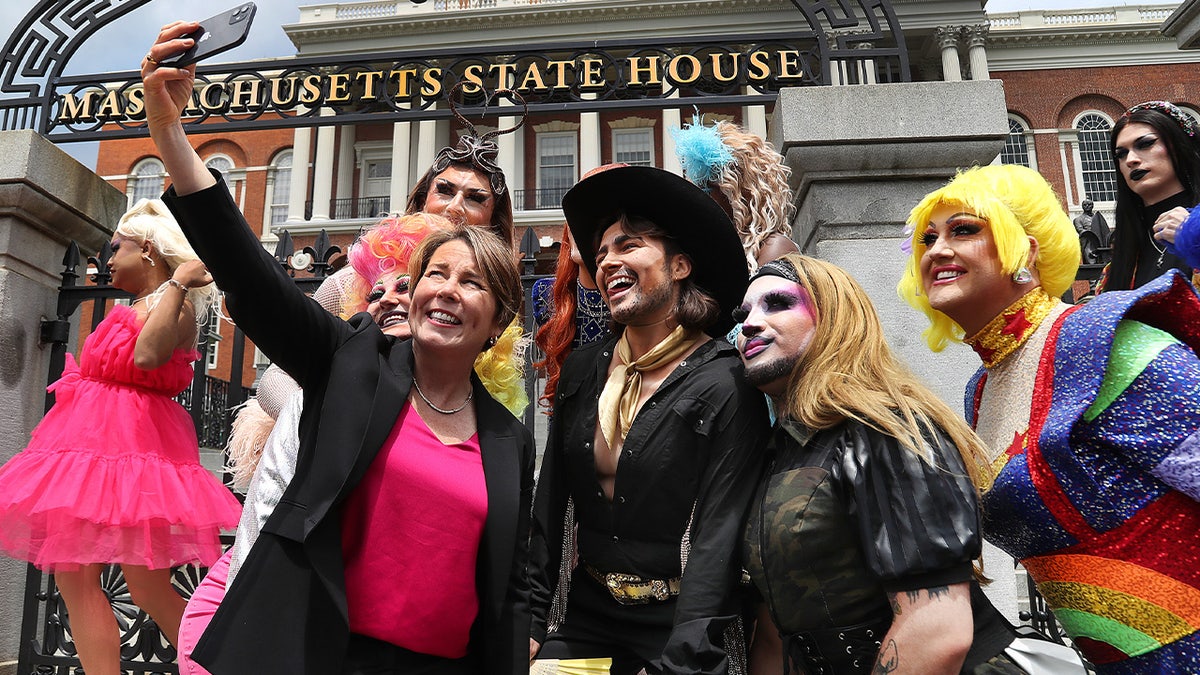Massachusetts
Massachusetts adopts new sex education guidelines for schools, moves to be more inclusive of LGBTQ+ community

Massachusetts public school students will receive updated sex and health education that is intended to be more inclusive of the LGBTQ+ community and teach about bodily autonomy, mental and emotional health, dating safety, nutrition, sexually transmitted infections and consent after officials unanimously voted to adopt new curriculum.
For the first time since 1999, the state Board of Elementary and Secondary Education (BESE) will adopt a new set of curriculum frameworks for schoolchildren from kindergarten to 12th grade.
While these new frameworks have been approved, Massachusetts does not require schools to teach sexual education, but recommends them. Districts can choose whether to adopt the curriculum or write their own standards.
Massachusetts Gov. Maura Healey (Pat Greenhouse/The Boston Globe via Getty Images/File)
DEMOCRAT GOVERNOR FIRST IN NATION TO BAN HER STATE GOVERNMENT FROM BUYING THIS COMMON ITEM
Gov. Maura Healey, the nation’s first openly lesbian governor, celebrated the decision, saying in a press conference Tuesday that the state “is leading the way by providing a health and physical education framework that is inclusive, medically accurate and age-appropriate to help them make decisions that are right for their health and wellbeing.”
“We are grateful to the Board for approving the first update to the health education frameworks in more than two decades, and we appreciate the input we received from residents across the state,” she added.
The state’s new sex and health education standards include different guidelines for four age groups: pre-K through second grade; grades 3-5; grades 6-8; and grades 9-12.

Massachusetts’ new sex and health education standards include different guidelines for four age groups: pre-K through second grade; grades 3-5; grades 6-8; and grades 9-12. (iStock)
For the youngest students, the new guidelines from the state include decision-making, social awareness, hygienic habits such as washing hands, learning how to respond in emergency situations, discussing gender-role stereotypes, and treating everyone with respect.
As children get older, the guidelines include education about gender identity, sexual orientation and sexual health.
NEW HAMPSHIRE GOVERNOR WARNS BIDEN IS LOSING SUPPORT AMONG DEMOCRATS
In a guideline for third to fifth graders, the standards say that the class will be able to, “describe the differences between assigned sex at birth and gender identity and explain how one’s outward appearance and behavior does not define one’s gender identity or sexual orientation,” by the end of fifth grade.
In the standards for grades 6 through 8, the goal is for the students to be able to describe sexual and physical consent as well as healthy living, physical exercise and substance use.
Similarly, high school students goals include discussing, “the role of personal and collective beliefs and values in creating a culture free of bullying, sexual harassment, sexual abuse, sexual assault, exploitation, incest, rape, domestic violence, dating violence, and gender-based violence.”

Massachusetts Gov. Maura Healey takes a selfie on the State House steps with members of the LGBTQ+ community. (John Tlumacki/The Boston Globe via Getty Images/File)
Adam Schepis, who has a 14-year-old transgender son, told the education board Tuesday that LGBTQ+ students often don’t have access to sexual education curriculum that reflect how they feel about themselves.
“It’s critical that LGBTQ kids can see themselves and hear of themselves in school,” he said. “Even at a young age, many of these kids know that they’re different but don’t have the language to articulate it.”
Conservative organizations have disagreed with the governor, saying that she is not listening to the concerns of Massachusetts parents and prioritizing “activist ideologies.”
CLICK HERE TO GET THE FOX NEWS APP
“Despite receiving thousands of comments from parents who did not approve of the draft Framework, BESE forged ahead, making no substantive content changes in the topics of human sexuality and gender identity,” Massachusetts Family Institute President Ian Huyett told Fox News Digital. “Our educational leaders have sent a message that they prioritize activist ideologies over constituent feedback.
“Massachusetts Family Institute will continue to stand with parents to protect their kids from sexualization and gender confusion in schools.”

Massachusetts
Mass. gives noncompliant towns more time to meet MBTA zoning regulations

The Healey administration filed emergency regulations late Tuesday afternoon to implement the controversial law meant to spur greater housing production, after Massachusetts’ highest court struck down the last pass at drafting those rules.
The Supreme Judicial Court upheld the MBTA Communities Act as a constitutional law last week, but said it was “ineffective” until the governor’s Executive Office of Housing and Livable Communities promulgated new guidelines. The court said EOHLC did not follow state law when creating the regulations the first time around, rendering them “presently unenforceable.”
The emergency regulations filed Tuesday are in effect for 90 days. Over the next three months, EOHLC intends to adopt permanent guidelines following a public comment period, before the expiration of the temporary procedures, a release from the office said.
“The emergency regulations do not substantively change the law’s zoning requirements and do not affect any determinations of compliance that have been already issued by EOHLC. The regulations do provide additional time for MBTA communities that failed to meet prior deadlines to come into compliance with the law,” the press release said.
Massachusetts’ Supreme Judicial Court ruled that the state’s attorney general has the power to enforce the MBTA Communities Law, which requires communities near MBTA services to zone for more multifamily housing, but it also ruled that existing guidelines aren’t enforceable.
Follow NBC10 Boston:
https://instagram.com/nbc10boston
https://tiktok.com/@nbc10boston
https://facebook.com/NBC10Boston
Tweets by NBC10Boston
https://bsky.app/profile/nbcboston.com
The MBTA Communities Act requires 177 municipalities that host or are adjacent to MBTA service to zone for multifamily housing by right in at least one district.
Cities and towns are classified in one of four categories, and there were different compliance deadlines in the original regulations promulgated by EOHLC: host to rapid transit service (deadline of Dec. 31, 2023), host to commuter rail service (deadline of Dec. 31, 2024), adjacent community (deadline of Dec. 31, 2024) and adjacent small town (deadline of Dec. 31, 2025).
Under the emergency regulations, communities that did not meet prior deadlines must submit a new action plan to the state with a plan to comply with the law by 11:59 p.m. on Feb. 13, 2025. These communities will then have until July 14, 2025, to submit a district compliance application to the state.
Communities designated as adjacent small towns still face the Dec. 31, 2025 deadline to adopt compliant zoning.
The town of Needham voted Tuesday on a special referendum over whether to re-zone the town for 3,000 more units of housing under Massachusetts’ MBTA Communities law.
Follow NBC10 Boston:
https://instagram.com/nbc10boston
https://tiktok.com/@nbc10boston
https://facebook.com/NBC10Boston
Tweets by NBC10Boston
https://bsky.app/profile/nbcboston.com
Like the old version of the guidelines, the new emergency regulations gives EOHLC the right to determine whether a city or town’s zoning provisions to allow for multi-family housing as of right are consistent with certain affordability requirements, and to determine what is a “reasonable size” for the multi-family zoning district.
The filing of emergency regulations comes six days after the SJC decision — though later than the governor’s office originally projected. Healey originally said her team would move to craft new regulations by the end of last week to plug the gap opened up by the ruling.
“These regulations will allow us to continue moving forward with implementation of the MBTA Communities Law, which will increase housing production and lower costs across the state,” Healey said in a statement Tuesday. “These regulations allow communities more time to come into compliance with the law, and we are committed to working with them to advance zoning plans that fit their unique needs.”
A total of 116 communities out of the 177 subject to the law have already adopted multi-family zoning districts to comply with the MBTA Communities Act, according to EOHLC.
Massachusetts
Revere city councilor slams Massachusetts officials for being ‘woke’ after migrant shelter bust

A Revere city councilor says the state’s right-to-shelter law is a “perfect example” of how “woke” ideologies are harmful, as he addressed the arrest of a migrant who allegedly had an AR-15 and 10 pounds of fentanyl at a local hotel.
Originally Published:
Massachusetts
Massachusetts senator seeks to extend deadline for TikTok ban | TechCrunch

Senatory Ed Markey (D-Mass.) is planning to introduce legislation to extend the TikTok ban deadline by 270 days. TikTok has warned of a looming shutdown in just five days, but the new legislation, officially called the Extend the TikTok Deadline Act, would give TikTok more time to divest from its Chinese parent company ByteDance, if approved by Congress.
TikTok is currently expected to “go dark” on January 19, unless the Supreme Court intervenes to delay the ban. The Supreme Court is weighing the ban, and is expected to decide sometime this week whether the law behind the ban violates the First Amendment.
“As the January 19th deadline approaches, TikTok creators and users across the nation are understandably alarmed,” Markey said in a Senate floor speech on Monday. “They are uncertain about the future of the platform, their accounts, and the vibrant online communities they have cultivated. “These communities cannot be replicated on another app. A ban would dismantle a one-of-a-kind informational and cultural ecosystem, silencing millions in the process.”
Markey noted that while TikTok has its problems and poses a “serious risk” to the privacy and mental health of young people, a ban “would impose serious consequences on millions of Americans who depend on the app for social connections and their economic livelihood.”
Markey and Senator Rand Paul (R-Ky.), along with Congressman Ro Khanna (CA-17), recently submitted a bipartisan amicus brief urging the Supreme Court to reverse the D.C. Circuit Court’s decision that upheld the TikTok ban. The trio argued that the TikTok ban conflicts with the First Amendment.
-

 Health1 week ago
Health1 week agoOzempic ‘microdosing’ is the new weight-loss trend: Should you try it?
-
/cdn.vox-cdn.com/uploads/chorus_asset/file/25822586/STK169_ZUCKERBERG_MAGA_STKS491_CVIRGINIA_A.jpg)
/cdn.vox-cdn.com/uploads/chorus_asset/file/25822586/STK169_ZUCKERBERG_MAGA_STKS491_CVIRGINIA_A.jpg) Technology6 days ago
Technology6 days agoMeta is highlighting a splintering global approach to online speech
-

 Science4 days ago
Science4 days agoMetro will offer free rides in L.A. through Sunday due to fires
-
/cdn.vox-cdn.com/uploads/chorus_asset/file/25821992/videoframe_720397.png)
/cdn.vox-cdn.com/uploads/chorus_asset/file/25821992/videoframe_720397.png) Technology1 week ago
Technology1 week agoLas Vegas police release ChatGPT logs from the suspect in the Cybertruck explosion
-

 Movie Reviews1 week ago
Movie Reviews1 week ago‘How to Make Millions Before Grandma Dies’ Review: Thai Oscar Entry Is a Disarmingly Sentimental Tear-Jerker
-

 Health1 week ago
Health1 week agoMichael J. Fox honored with Presidential Medal of Freedom for Parkinson’s research efforts
-

 Movie Reviews1 week ago
Movie Reviews1 week agoMovie Review: Millennials try to buy-in or opt-out of the “American Meltdown”
-

 News1 week ago
News1 week agoPhotos: Pacific Palisades Wildfire Engulfs Homes in an L.A. Neighborhood















